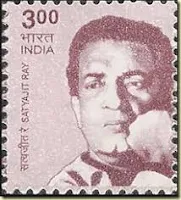Satyajit Ray (2 May 1921 – 23 April 1992) was an Indian filmmaker, screenwriter, graphic artist, music composer and author, widely regarded as one of the greatest filmmakers of the 20th century. Ray was born in the city of Calcutta into a Bengali Brahmo family of Bengali Kayastha origin which was prominent in the field of arts and literature. Starting his career as a commercial artist, Ray was drawn into independent filmmaking after meeting French filmmaker Jean Renoir and viewing Vittorio De Sica's Italian neorealist film Bicycle Thieves (1948) during a visit to London.
Ray directed 36 films, including feature films, documentaries and shorts. He was also a fiction writer,
 publisher, illustrator, calligrapher, music composer, graphic designer and film critic. He authored several short stories and novels, meant primarily for young children and teenagers. Feluda, the sleuth, and Professor Shonku, the scientist in his science fiction stories, are popular fictional characters created by him.
publisher, illustrator, calligrapher, music composer, graphic designer and film critic. He authored several short stories and novels, meant primarily for young children and teenagers. Feluda, the sleuth, and Professor Shonku, the scientist in his science fiction stories, are popular fictional characters created by him. Ray received many awards, including 32 National Film Awards by the Government of India, and awards at international film festivals. At the 11th Moscow International Film Festival in 1979, he was awarded with the Honorable Prize for the contribution to cinema. At the Berlin International Film Festival, he was one of only four filmmakers to win the Silver Bear for Best Director more than once and holds the record for the most number of Golden Bear nominations, with seven. At the Venice Film Festival, where he had previously won a Golden Lion for Aparajito (1956), he was awarded the Golden Lion Honorary Award in 1982. That same year, he received an honorary "Hommage à Satyajit Ray" award at the 1982 Cannes Film Festival.
Ray received many awards, including 32 National Film Awards by the Government of India, and awards at international film festivals. At the 11th Moscow International Film Festival in 1979, he was awarded with the Honorable Prize for the contribution to cinema. At the Berlin International Film Festival, he was one of only four filmmakers to win the Silver Bear for Best Director more than once and holds the record for the most number of Golden Bear nominations, with seven. At the Venice Film Festival, where he had previously won a Golden Lion for Aparajito (1956), he was awarded the Golden Lion Honorary Award in 1982. That same year, he received an honorary "Hommage à Satyajit Ray" award at the 1982 Cannes Film Festival.
Ray is the second film personality after Chaplin to have been awarded an honorary doctorate by Oxford University. He was awarded the Dadasaheb Phalke Award in 1985 and the Legion of Honor by the President of France in 1987. The Government of India awarded him the Padma Bhushan in 1965 and the highest civilian honor, Bharat Ratna, shortly before his death honored in 1992. The Academy of Motion Picture Arts and Sciences awarded Ray an Honorary Oscar in 1992 for Lifetime Achievement. It was one of his favorite actresses, Audrey Hepburn, who represented the Academy on that day in Calcutta. Ray, unable to attend the ceremony due to his illness, gave his acceptance speech to the Academy via live video feed from the hospital bed. In 1992 he was posthumously awarded the Akira Kurosawa Award for Lifetime Achievement in Directing at the San Francisco International Film Festival; it was accepted on his behalf by actress Sharmila Tagore.
In 1992, the Sight & Sound Critics' Top Ten Poll ranked Ray at No. 7 in its list of "Top 10 Directors" of all time, making him the highest-ranking Asian filmmaker in the poll. In 2002, the Sight & Sound critics' and directors' poll ranked Ray at No. 22 in its list of all-time greatest directors, thus making him the fourth highest-ranking Asian filmmaker in the poll. In 1996, Entertainment Weekly magazine ranked Ray at No. 25 in its "50 Greatest Directors" list. In 2007, Total Film magazine included Ray in its "100 Greatest Film Directors Ever" list.

